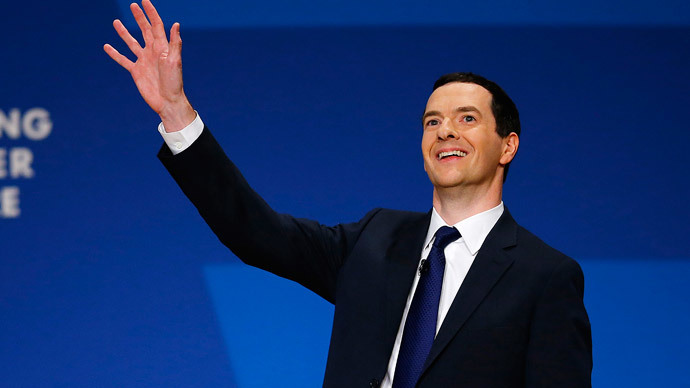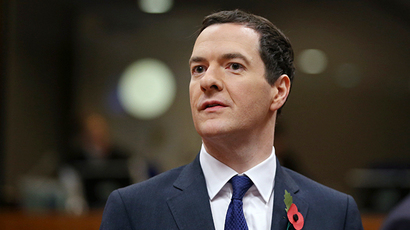UK’s £75bn overspend threatens Osborne’s deficit recovery plan – OBR

George Osborne’s plan to cut the UK’s budget deficit has been shattered by the revelation that the government will have to borrow as much as £75 billion more than it had originally planned over the next five years.
A fiscal forecast from the Office of Budget Responsibility (OBR) has revealed that the UK’s economic outlook is much bleaker than the government has let on. The coalition aimed to reduce the deficit in 2015 to £40 billion, but the latest figures show that it will actually be almost £100 billion.
The OBR forecast may force Osborne to admit that the government's austerity plans to reduce the deficit are far off track in his autumn statement due on Wednesday.
The report suggests that the total borrowing figure will be revised upward, with the complete budget deficit expected to be £280 billion by 2020. The figures show that the UK will have a deficit of £75 billion more than previously expected.
The increased government borrowing has been affected by falling oil prices and decreased revenue from stamp duty and income tax. The government has already had to borrow £3.7 billion more during the first half of 2014, as the apparent rewards of the recovering economy were not felt by the treasury.
These figures will overshadow what Osborne was preparing to be a health-focused autumn report, following the early disclosure that the NHS will receive £2 billion per year in “extra funding.”
The NHS funding announcement was well received by senior health officials, but later fell under heavy criticism when it was revealed that a large proportion of the funding would come from “re-allocated” Department of Health funds.

The slowing housing market has also affected government borrowing, with the watchdog likely to reduce stamp duty expectations from the original £12.7 billion.
While there has been a significant rise in employment levels, a large proportion of the 700,000 newly employed workers are tied to zero-hour contracts, which has further had a negative impact on the levels of income tax the government receives.
A spokesperson for the Joseph Rowntree Foundation told the Guardian that changes in the UK’s employment status were “significant.”
“The labour market has changed significantly in the last ten years. There has been a vast increase in insecure work - zero hour contracts, part-time work and low-paid self-employment, which means that getting a job does not necessarily mean getting out of poverty” the spokesperson added.
David Tinsley, a UBS economist, told the Independent that the government's tax receipts from areas including income tax and oil are “disappointing,” adding that “in the main this appears to reflect weakness on the income side of the Government accounts.”
“We expect the OBR will have to acknowledge this, revising up borrowing in the current year and in the future years out to 2020. The cumulative increase in borrowing could be up to £75 billion,” he added.
Speaking on BBC’s Sunday Politics, Paul Johnson of the Institute of Fiscal Studies said that Osborne will be forced to admit that the county’s economy is not as promising as previous figures have suggested.
“We’ll probably end up with the deficit a bit higher than the OBR was expecting back in March,” he said.
“The consequence will be that by 2018 we are looking at spending cuts of one-third in a whole slew of public services.”
The treasury has declined to comment on the figures before the autumn statement.














